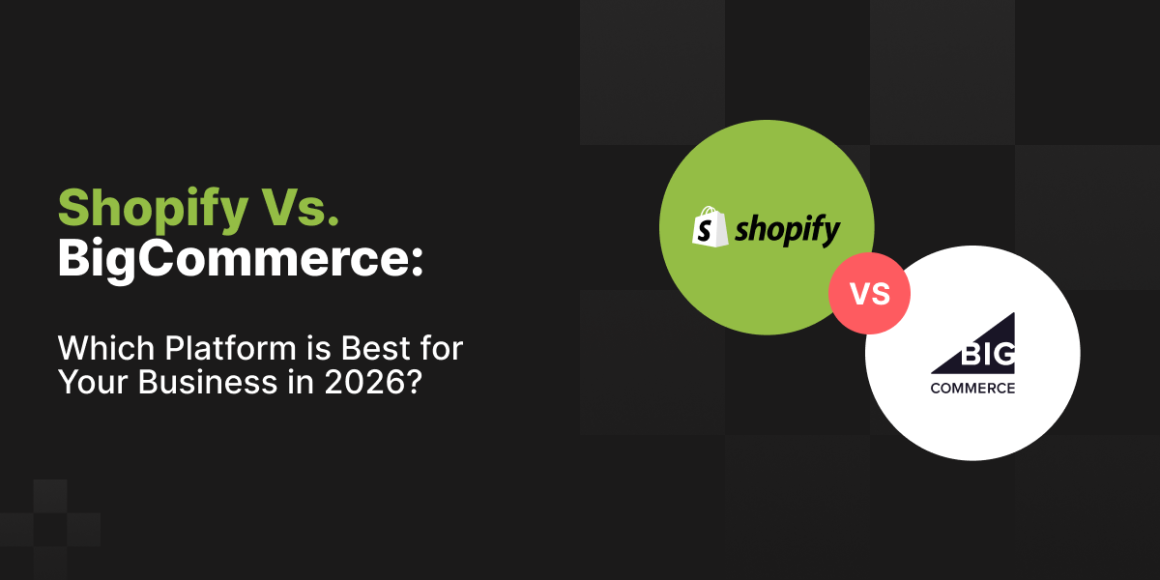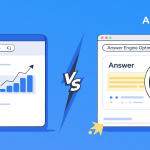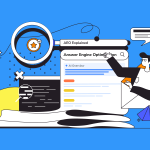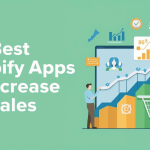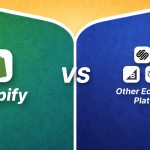Contents
If you are starting a new ecommerce business and aiming to gain success online, then SaaS based ecommerce platforms are your best solution to keep up in the competitive world. When we talk about an e-commerce online platform, the two key players, Shopify and BigCommerce, are providing comprehensive solutions. But we all know how competitive the online market is, and amidst this, selecting the right ecommerce platform is a challenge. It’s not about just features, it’s a strategic choice that can make your brand and online business.
We have compared Shopify and BigCommerce so that you can make an informed decision. Let’s compare and see which one is great for your business.
Shopify Vs. BigCommerce Comparison
| Factors | Shopify | BigCommerce | Winner |
| Ease of Use | It’s easy to use, beginner-friendly, and has a user-friendly editor. | It has advanced features which require technical skills. | Shopify |
| Pricing & Costs | Shopify applies transaction fees, but the fees depend on the plan. | It has lower additional costs and does not charge any transaction fees, no matter the plan you choose. | BigCommerce |
| Customization | It’s easily customizable; no coding is required. | It requires knowledge of coding to make the customization. | Shopify |
| Theme and Design | Shopify provides a wide range of theme which attracts users and are customizable. | BigCommerce provides limited themes compared to Shopify. | Shopify |
| Apps and Scalability | Shopify has a large ecosystem of apps that will help you grow your business. | BigCommerce has built-in features that reduce the requirement for apps and provide unlimited API calls for Enterprise plans. | Shopify |
| Security | Shopify provides store protection and also validates safe online payments. | BigCommerce provides standard and layer protection for users’ data protection and privacy. | Tie |
| Payment gateways | Shopify has an in-house Shopify Payments with no transaction fees. | BigCommerce gives flexibility in payment providers with no transaction fees. | BigCommerce |
| Marketing features | Require some additional apps to support SEO and marketing. | It provides marketing tools that are accessible and have excellent features. | Tie |
| Sales features | Shopify requires third-party apps to accelerate more sales. But it also has some in-house apps and a POS system to boost sales. | BigCommerce also requires third-party apps and has integrated sales and POS systems. | Tie |
| eCommerce dropshipping | Shopify supports dropshipping. You can also install third-party apps to support dropshipping. | You need to have third-party apps for running a dropshipping model. | Shopify |
| Customer support | It provides better customer support through multiple channels with extra social media support. | It provides support through email, live chat, and other platforms. | Shopify |
Shopify vs BigCommerce: Who’s Dominating the eCommerce Game Right Now?
If we compare which one is the bigger player and dominating the current ecommerce market of the United States in 2026, then Shopify is the platform. With a market share of 28%, and 3.13 million websites in the USA alone. And if we see the bigger picture, globally Shopify has around 5.90 million live websites, which shows the growth and strong position of Shopify in the market.
Whereas BigCommerce has a minimal number of websites live compared to Shopify. It has a market share of 0.2% in the United States, which means around 29,719 websites. The global live website of BigCommerce is around 40,131 websites (Live).
According to statistics, it’s clear that Shopify has an extensive user base and a higher market value compared to BigCommerce, including the USA and globally.
Winner – Shopify
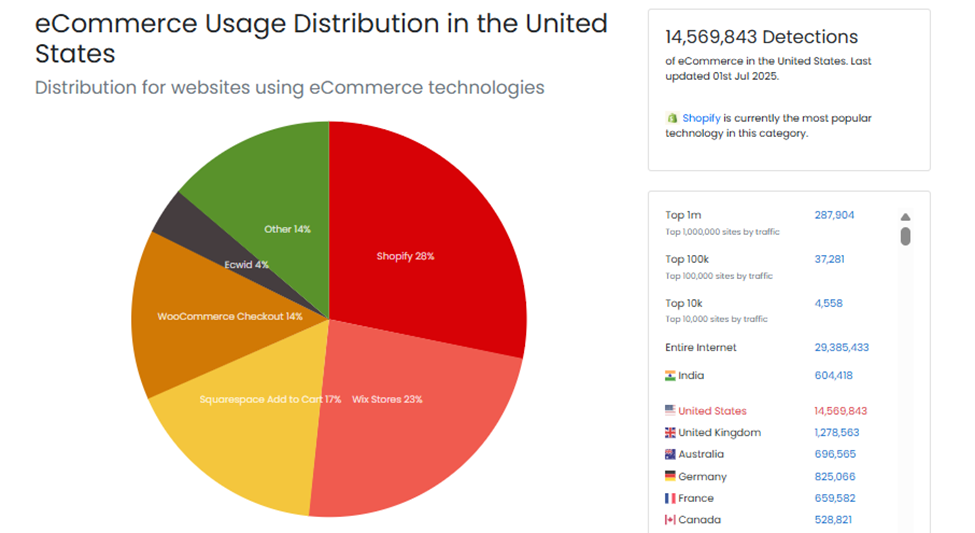
Source – https://trends.builtwith.com/shop/country/United-States
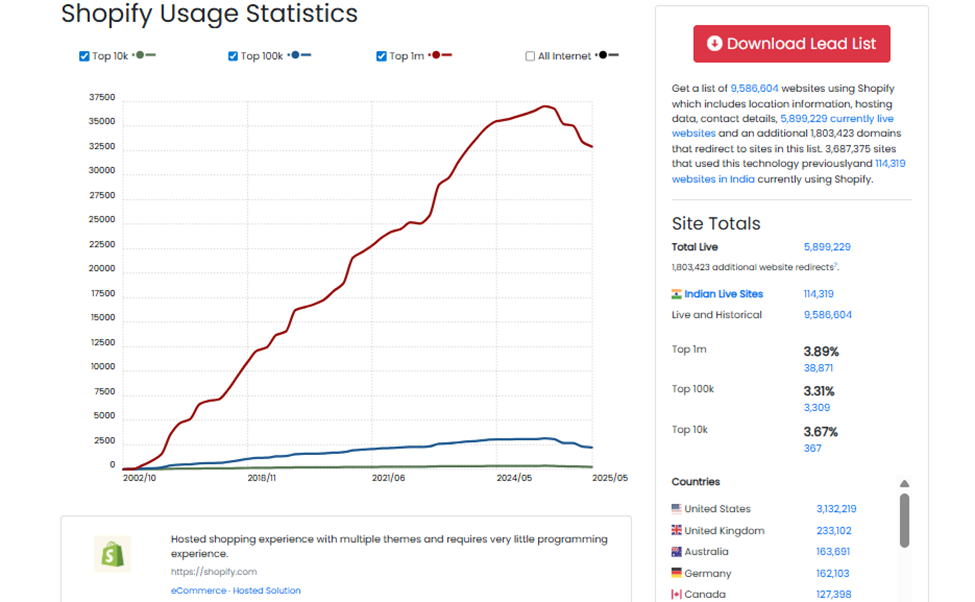
App Stores & Integrations: Which Platform Has the Upper Hand?
Shopify has more than 8000 apps available on its App Store. It has a wide range of third-party as well as in-house applications and plugins. Shopify has a tool for everything, including marketing and upsell tools like Shopify Email, Wiser AI (product recommendation app), SEO Optimizer to check the performance of the stores, Mailchimp, and now even Microsoft Clarity is available on the Shopify App Store to track the user journey. All these apps help you grow your ecommerce store faster.
Now let’s talk about integration.. Shopify supports integration with popular platforms and services like social media platforms (and recently included TikTok, Snapchat, YouTube Selling, and Microsoft Advertising), shipping carriers, accounting software, email marketing tools and more. And it’s not limited to that, Shopify provides built-in integration to sell products digitally and also supports sales channels like Amazon and eBay.
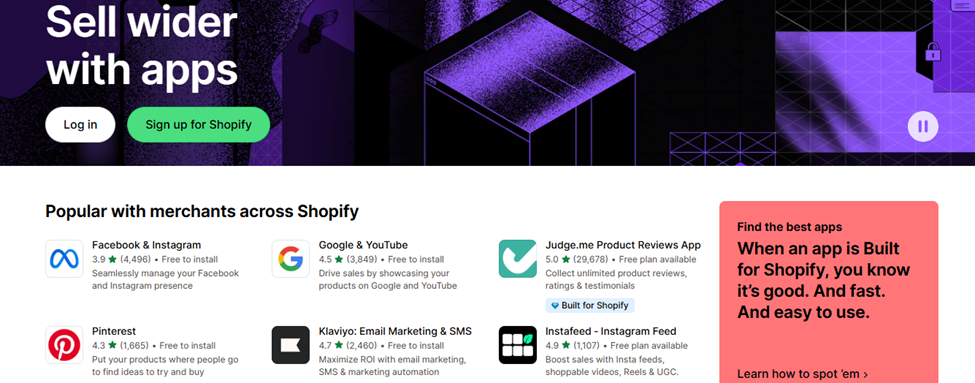
BigCommerce does not have a huge App store like Shopify. It focuses more on built-in features and integration that provide businesses with comprehensive solutions without relying on additional apps. It is especially for Enterprise Resource Planning (ERP) integration, which can be more helpful for larger businesses.
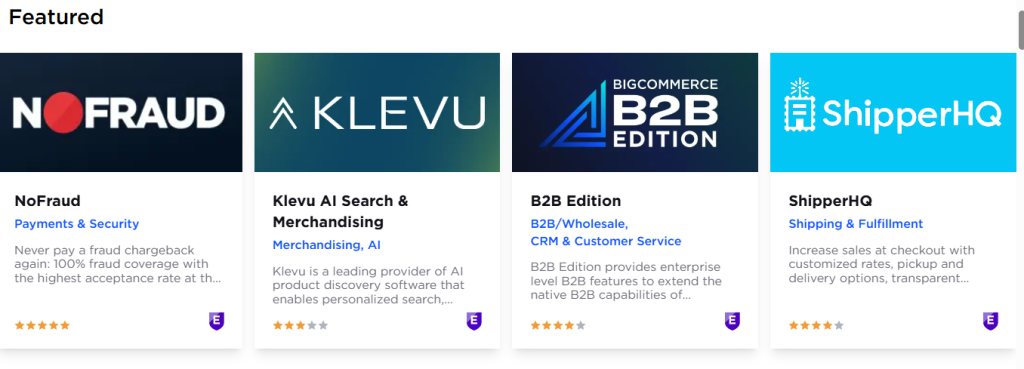
BigCommerce has strong SEO capabilities, which eventually eliminates the additional app requirement. You can easily add cart-level discounts, coupon codes and much more without needing to install any third-party app.
Winner – Shopify
Shopify Or BigCommerce, Which Platform Has Better Design Options?
Beautiful store or we say user friendly UI/UX increases the chances of converting visitors into customers. Shopify and BigCommerce both provide a wide range of design options for merchants to choose from to create their online presence.
Here is a comparison of their design options:
Theme Selection
Shopify provides a wide range of themes, which include both paid and free. You can check all these themes in the Shopify store. It gives you 25 free themes and 871 paid themes. The paid theme can cost you around $100 to $500. Don’t worry, a preview is available so you can check first and then make a purchase.
BigCommerce provides both paid themes and free themes. It has around 282 themes and 12 free themes. The paid theme can cost you around $195 to $350.
Note: Shopify and BigCommerce both allow you to install third-party themes, but make sure that they are compatible.
Mobile Responsiveness
Shopify and BigCommerce both provide mobile-responsive themes. All the themes will automatically adjust according to different screen sizes.
User Friendly
Shopify is super easy to use. If you don’t have a technical background, the platform is perfect for you. Its theme editor helps beginners easily drag and drop to create great design without require any coding experience.
When it comes to BigCommerce theme, they are known for their customization. But it requires technical knowledge, as it requires HTML and CSS customization and is AMP enabled, making it a tough task for non-technical users.
Speed
One thing you need to keep in mind is that you should avoid over customizing the theme, as it creates speed loading issues.
Design Focused App
Shopify App Store has many apps, some are inbuilt and some are third-party apps like Gempages, Landing Page Builder, PageFly and much more to improve your store layout. However, when it comes to BigCommerce, it provides very few page builder apps which are focused on designs.
Winner- Shopify
Compare Shopify vs other ecommerce platforms for a better decision!
Which Platform Offers Better SEO Features: Shopify or BigCommerce?
SEO is a tricky yet simple game, and it’s all about user experience on your website. Shopify has built-in SEO features to optimize your store for users. It also has the advantage of a third-party applications ecosystem. With more than 500 SEO based applications, you can easily optimize your online store. The apps will provide you with a detailed report of issues and fixes, so that you can easily fix them. Shopify supports SEO practices as it lets you submit a Sitemap, has a local store structure, lets you optimize images, and fixes on-page SEO. You can do content marketing as well on Shopify, integrate Microsoft Clarity, Google Analytics, and other analytics to get a detailed report and understand how your users are interacting with your website. For better results you can work with Shopify SEO experts.
And if we talk about BigCommerce, it’s well known for its SEO features, as it provides optimized URLs for all the pages including products, categories and other pages. This ensures that every page has a different URL, which helps in avoiding duplicate content penalties. BigCommerce auto updates the URLs and redirects the old URL to the new URL, for example, if you have renamed a product, it will automatically update the URL. It also has inbuilt meta descriptions, which will help you with search results and increase the chances of showing your listing with information like prices, brands, reviews, delivery time, stock availability, and much more.
BigCommerce uses a CDN (content delivery network) so that your site loads quickly for customers and search engines.
Winner – Tie, both have great SEO features.
Shopify vs. BigCommerce, Which One Provides Better Value for Money?
Shopify provides 4 pricing plans, all the plans are designed for different business needs:
Basic – This plan is for Solo entrepreneurs, starting at $29/month. It provides features like up to 77% shipping discounts, 10 inventory locations, 24/7 chat support, and in-person selling via POS devices or phones.
Grow – For small teams, Shopify provides a grow plan, starting at $79/month. The features it includes – up to 88% shipping discount and insurance, 10 inventory locations, 24/7 chat support, 5 staff accounts, and selling through POS or device.
Advanced – As your business scales, you need an advanced plan. Shopify provides an advanced plan starting at $299/month and provides features like up to 88% shipping discount, insurance, 3rd party calculated rates, 10 inventory locations, 24/7 chat support, local storefronts by market, 15 staff accounts, in-person selling by POS device or by phone.
Plus – If you are a big or complex business, then Shopify has a Plus plan for you starting at $2300/month. It has a wide range of features, like up to 88% shipping discount, insurance, 3rd party calculated rates, 200 inventory locations, priority 24/7 phone support, local storefronts by market, unlimited staff accounts, customizable, high-volume checkout, up to 200 POS pro locations, and sell wholesale/B2B.
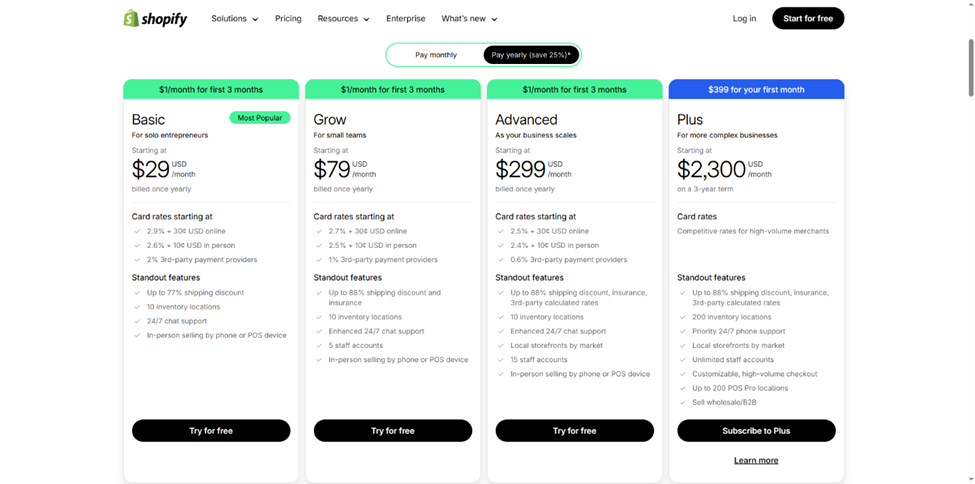
Shopify also provides alternative solutions for businesses – Starter and Retail. In the starter plan, for just $5/month, you can instantly sell through social media and messaging apps or a simple online store. And with the retail plan, for just $89/month, you get an in-person selling tool with advanced staff, inventory, and loyalty features.
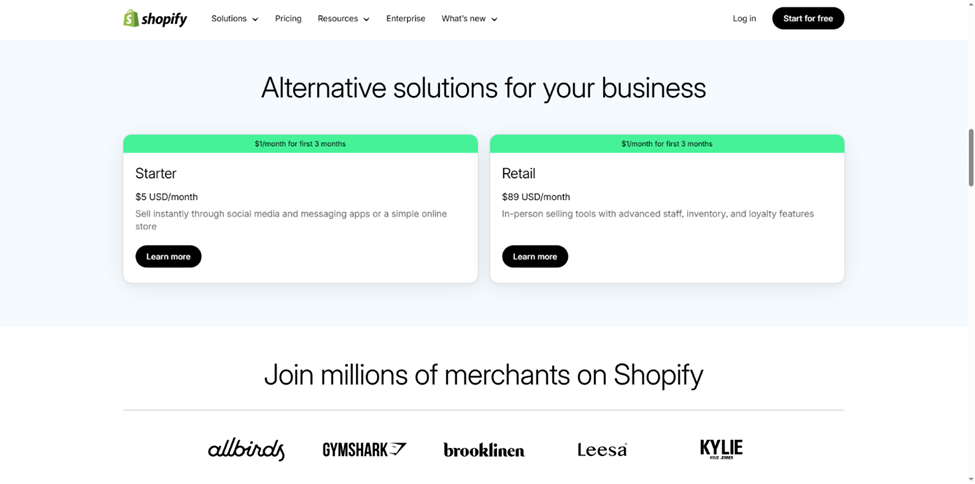
BigCommerce Pricing feature:
BigCommerce also provide 4 main pricing plans designed for all type and size of businesses:
Standard – This plan is for small brands and individuals and provides features like 24/7 live phone and chat support, 0% added payment fees, and up to $50K online revenue. It cost $29/month.
Plus – For ambitious small businesses, this plan is good. It costs $79/month and provides 24/7 live phone and chat support, 0% added payment fees, and up to $180K online revenue.
Pro – If you have a fast growing business, then Pro plan is for you. It provides up to $400k+ online revenue, 0% added payment fees and 24/7 live phones and chat support. It costs around $299/month.
Enterprise/Custom – This one is for well-established businesses and provides features including 24/7 live phones and chat support, best for $1M+ online revenue.
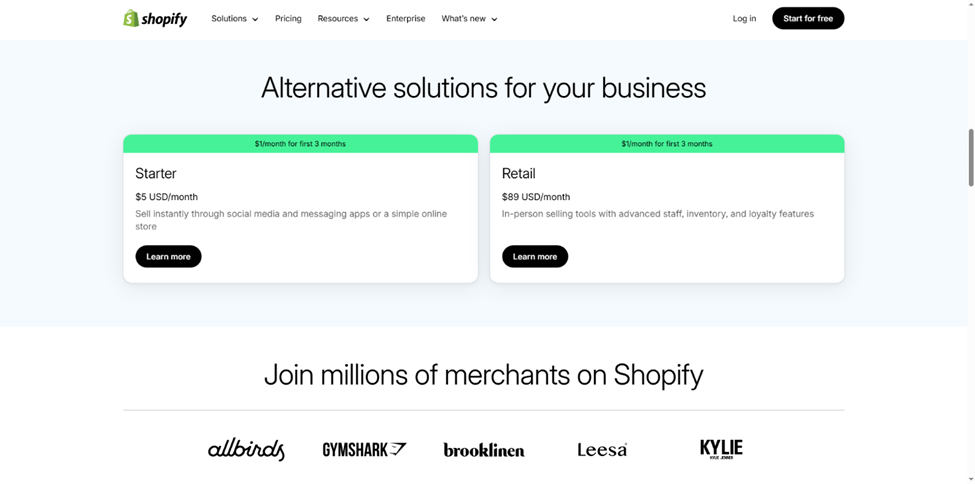
Winner – Shopify
Who’s Got Better Security?
Shopify and BigCommerce both provide and prioritize security. Here are the details:
Shopify and BigCommerce both have needed security features like two-factor authentication, strong password policies, multifactor authentication, login attempt limit, reCAPTCHA, and advanced-level security policies. And with Shopify the plus point is the hosted platform, which further adds a security level for store owners. Shopify utilizes risk analysis tools to check the fraudulent orders actively.
Shopify and BigCommerce comply with PCI DSS and Level 1 certification. Both have an SSL certificate, and also let you add a third-party SSL certificate.

Winner – Tie
The Winner Revealed: Shopify vs BigCommerce Final Verdict!
Both the e-commerce platforms are strong and have all the necessary tools you will require to maintain an online store. But if we see the detailed picture, Shopify has won this competition because it is user-friendly, provides value for money, has great design templates, better marketing and sales features, and support. One plus point is that Shopify is growing fast and becoming the most used ecommerce platform around the world.
But eventually, choosing the right platform depends on your business needs and vision. Both platforms serve different purposes, so choose wisely when it comes to your e-commerce business. And if you need Shopify experts or a Shopify SEO expert, then connect with our experts today at:
Email us at – info@expertvillagemedia.com
Call us at – +1 929 600 6830
Book a meeting with us – https://calendly.com/discuss-your-project/explore-solutions


